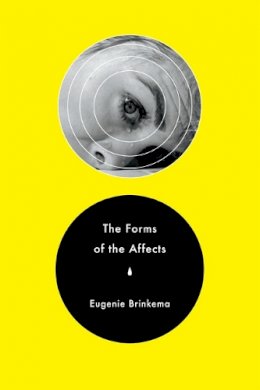
The Forms of the Affects
Eugenie Brinkema
Offering a bold corrective to the emphasis on embodiment and experience in recent affect theory, Eugenie Brinkema develops a novel mode of criticism that locates the forms of particular affects within the specific details of cinematic and textual construction. Through close readings of works by Roland Barthes, Hollis Frampton, Sigmund Freud, Peter Greenaway, Michael Haneke, Alfred Hitchcock, Søren Kierkegaard, and David Lynch, Brinkema shows that deep attention to form, structure, and aesthetics enables a fundamental rethinking of the study of sensation. In the process, she delves into concepts as diverse as putrescence in French gastronomy, the role of the tear in philosophies of emotion, Nietzschean joy as a wild aesthetic of repetition, and the psychoanalytic theory of embarrassment. Above all, this provocative work is a call to harness the vitality of the affective turn for a renewed exploration of the possibilities of cinematic form.
Product Details
About Eugenie Brinkema
Reviews for The Forms of the Affects
Tom Hastings
Review 31
“[Brinkema’s] first book restores affect as a theoretical site of limitless possibility rather than the term of interpretive foreclosure it has largely become. The Forms of the Affects is a tantalizingly ambitious contribution to affect theory that may even prove sui generis as affective film studies turns over a new leaf of close reading.”
Stephanie Amon
Afterimage
“Highly recommended. Graduate students, faculty, researchers.”
R. B. Wise
Choice
"[A] bold corrective to affect scholarship in film studies . . . as challenging theoretically as it is delightful and useful formally. It models freedom and ingenuity in its extraction of form out of intellectual history on emotions, etymology, and even culinary knowledge, and in its patient and playful reading of film."
Alina Haliliuc
Film Criticism
"Eugenie Brinkema’s The Forms of the Affects is an innovative book that will surely be of great interest to scholars of affect and film studies in particular, but the possibilities for her method will also be useful to those in visual studies, literary, feminist, and queer theory, philosophy, and cultural studies more broadly."
Rachel Alpha Johnston Hurst
Reviews in Cultural Theory
"To anyone interested in questions of form and affect, this important book is sure to generate discussion for some time to come.... Reading this book is, dare I say it, an exhilaratingly affective experience."
Jennifer Peterson
Film Quarterly
"The Forms of the Affects is a beautifully written, complex text that weaves together visual and temporal forms drawn from film and literature with the affects grief, disgust, anxiety and joy."
Dylann M. McLean
Emotion, Space and Society
